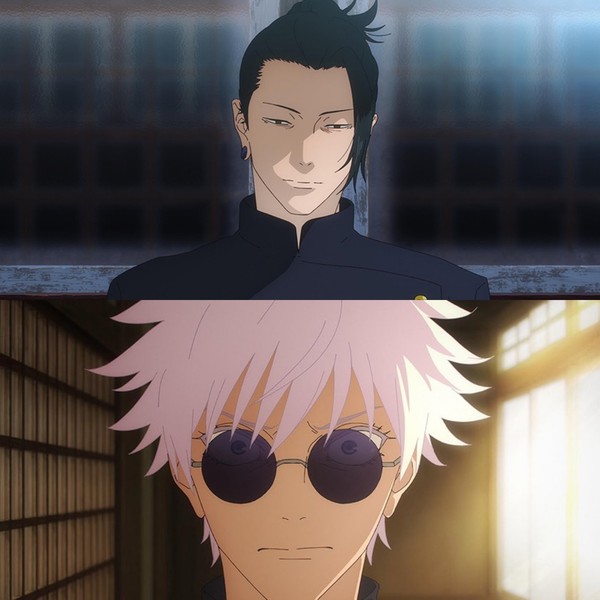Jujutsu Kaisen is an anime and manga series that follows the life of three student sorcerers and their teacher Gojo — the most powerful sorcerer in the series — as they join a secret organization to battle curses and evil sorcerers using their supernatural powers to protect humanity from dark forces. The Season 2 episodes that aired last month focused on Gojo’s past with his childhood best friend Geto. Numerous discussions around these episodes have arisen regarding Geto's transformation into a villain and Gojo's perspective on this matter. Viewers often suggest that Geto found happiness along his dark path; however, it is essential to clarify that we were never privy to Geto's point of view during the events where he broke up with Gojo.

The portrayal of events in Episode 5 reflected harsh reality, and not necessarily Geto's perception. Despite his supposed happiness after becoming a villain, his complex struggle to escape depression did not occur overnight. Geto's emotional change following his transformation shouldn't be seen as immediate happiness, but rather as a departure from the exhaustion he felt on a misguided path. To support this argument, one can refer to a line that Geto says near the end of the Jujutsu Kaisen 0 movie: “I just couldn’t wear a heartfelt smile in this world,” which signifies his perpetual lack of genuine happiness. Even before his pivotal decision to pursue genocide, he did not smile for himself, but rather to please Gojo. This demonstrates that his choice was primarily motivated by protecting Gojo — his one and only best friend — and his cherished values, albeit through unconventional means, rather than pursuing personal happiness.
To understand Geto's rationale, we must revisit the origins of his transformation, starting with the mission involving Riko's tragic death, a girl they were entrusted to protect. Believing Gojo was dead after fighting Toji, a non-sorcerer, Geto sought revenge. However, he faced defeat, leading him to doubt his own abilities and purpose. Despite his anger and doubt towards non-sorcerers, Geto shielded Gojo from these harsh realities when Gojo told him he wanted to kill the non-sorcerers, reflecting Geto’s acute emotional intelligence, careful consideration, and empathy.
Riko's death marked the beginning of Geto's disenchantment with those he perceived weak and unappreciative. His feelings can be likened to that of an employee organizing documents despite that not being their responsibility, only to be blamed and dismissed when a crucial document goes missing. His resentment grew over time. The turning point occurred when Geto met Yuki, their senior sorcerer, who inadvertently influenced his decision-making process. While Yuki was the only one who recognized Geto's deteriorating mental state, her suggestions were counterproductive. Yuki's words made Geto consider the 'easy' path, which promised more immediate results compared to the unpredictable 'hard' path. This scene reflects our society, where most people won’t notice your feelings, and the few who do will drop some advice and leave you behind. Despite acknowledging the potential consequences, Geto proceeded based on the perceived effectiveness of his actions. He had already mourned the loss of two close acquaintances and had nearly lost his best friend, which made him unwilling to stand idle as others, including himself, continued to suffer. Geto sought to alter the grim reality he perceived. Although his actions protected Gojo in the short and long term, they left Gojo burdened with grief and depression.
The breakup scene with Gojo illustrates Geto's determination to protect Gojo from the consequences of their chosen paths. He avoided physical and eye contact with Gojo, knowing that Gojo could sway his resolve. The looming execution sentence on Geto after he became a villain and burned down his own village prevented reconciliation between the two characters. Geto's harsh words were meant to deter Gojo, leaving him with doubt and confusion about their friendship. This incident led to Gojo’s burden, grief, and depression. In this particular scene Geto’s last words instilled a resilient mentality in Gojo, strengthened Gojo's resolve to protect himself and others and ensured he wouldn't follow a similar dark path. Had Geto truly sought healing to rectify his depression, he could have given up sorcery like Nanami, their junior sorcerer. In contrast, Geto remained committed to justice and sorcerer responsibilities. He realized that sorcerers needed protection more than common people, leading him to prioritize protecting his friends dear to his heart than the common people.
Jujutsu Kaisen's narrative blurs the lines between right and wrong, as each character pursues justice in their own way. It illustrates the complexity of justice and how it’s unachievable without falling into injustice. Characters lose their sanity to varying degrees throughout the story. The anime and manga delves into social dynamics and human connections, pointing out our flaws and highlighting how people often overlook others' emotional struggles and fail to provide necessary support. This can lead individuals to make drastic choices or descend into darkness, just like how Geto did.
In conclusion, Geto's transformation isn't about pursuing happiness but departing from an exhausting path. He remained committed to moral values and justice in his own way. Geto's character reminds us of the intricacies of human emotions and the importance of mental health awareness and support. Jujutsu Kaisen underscores the need for deeper understanding and empathy in society, particularly regarding mental health.

